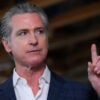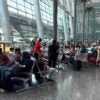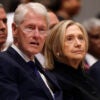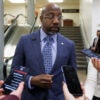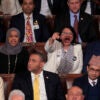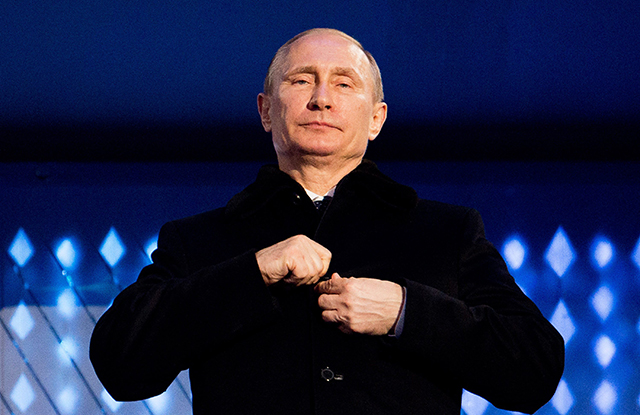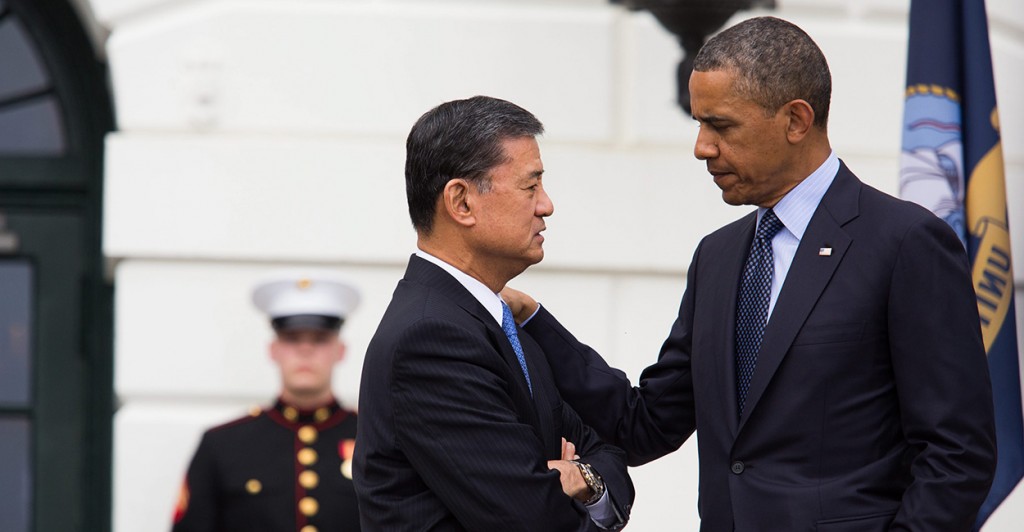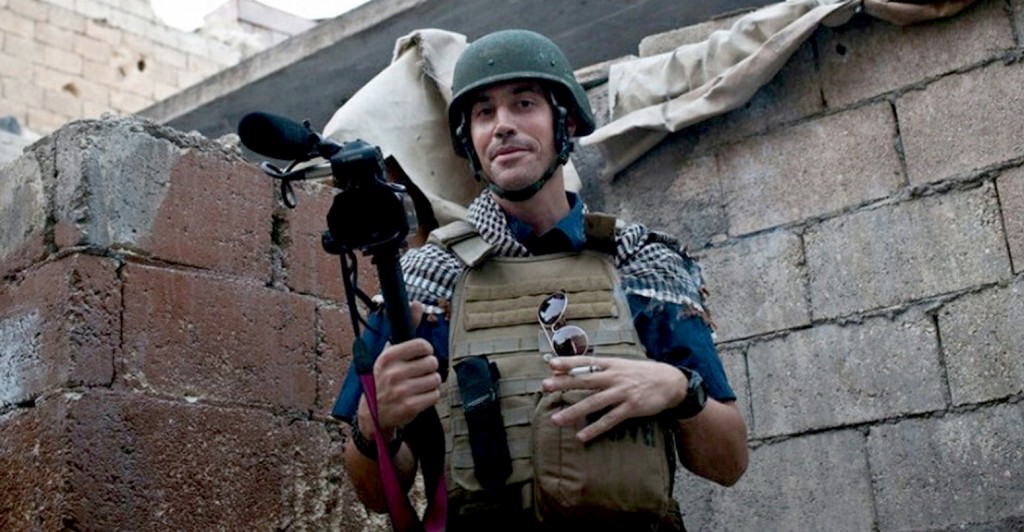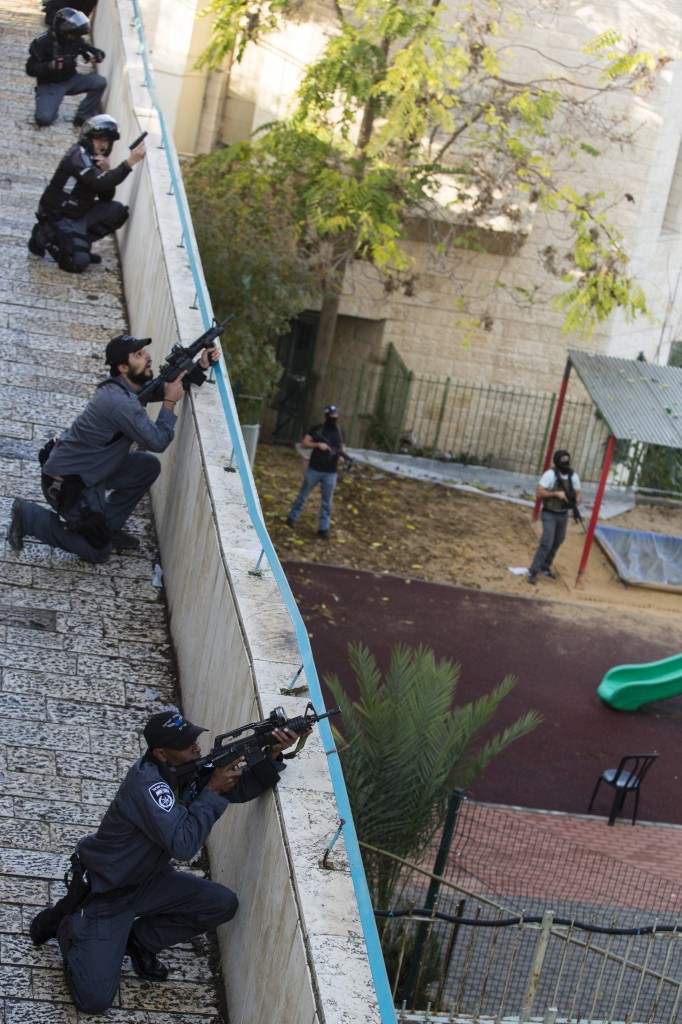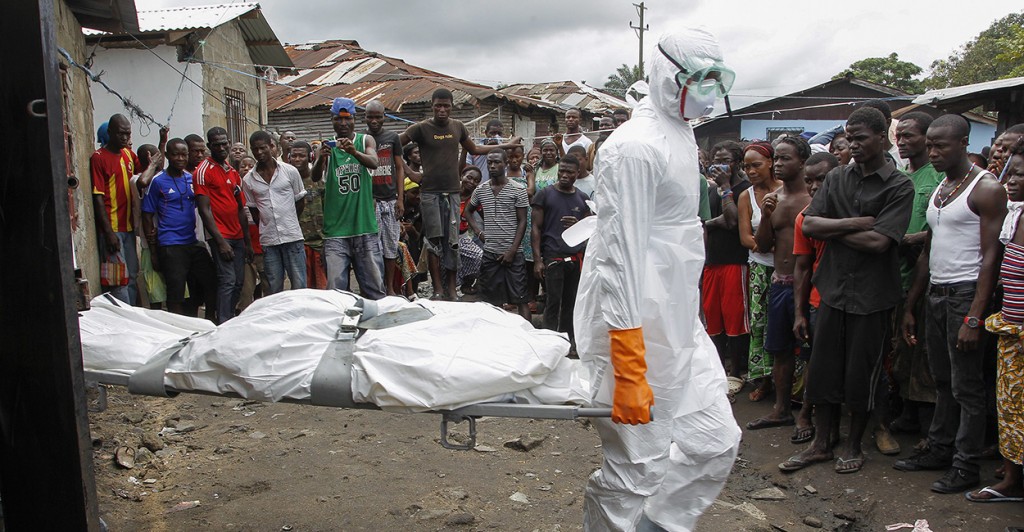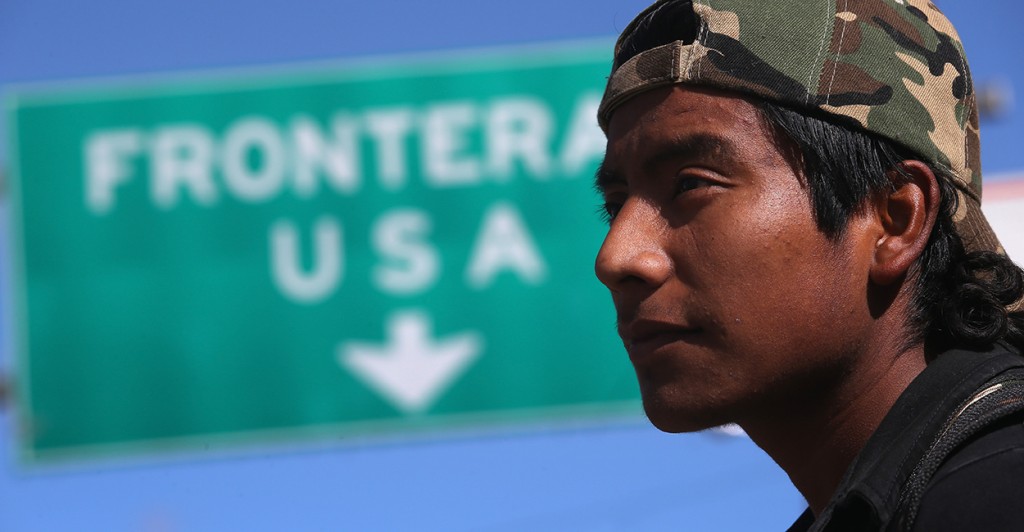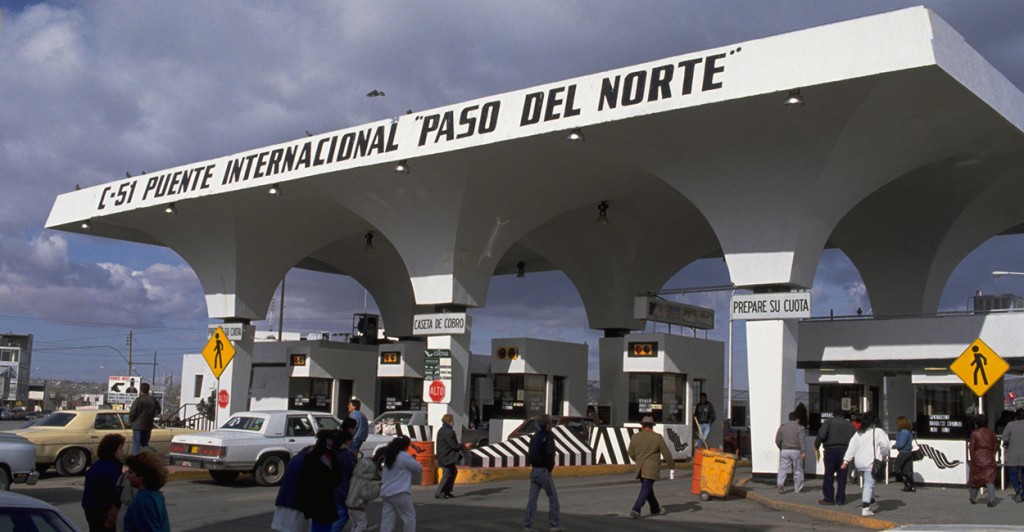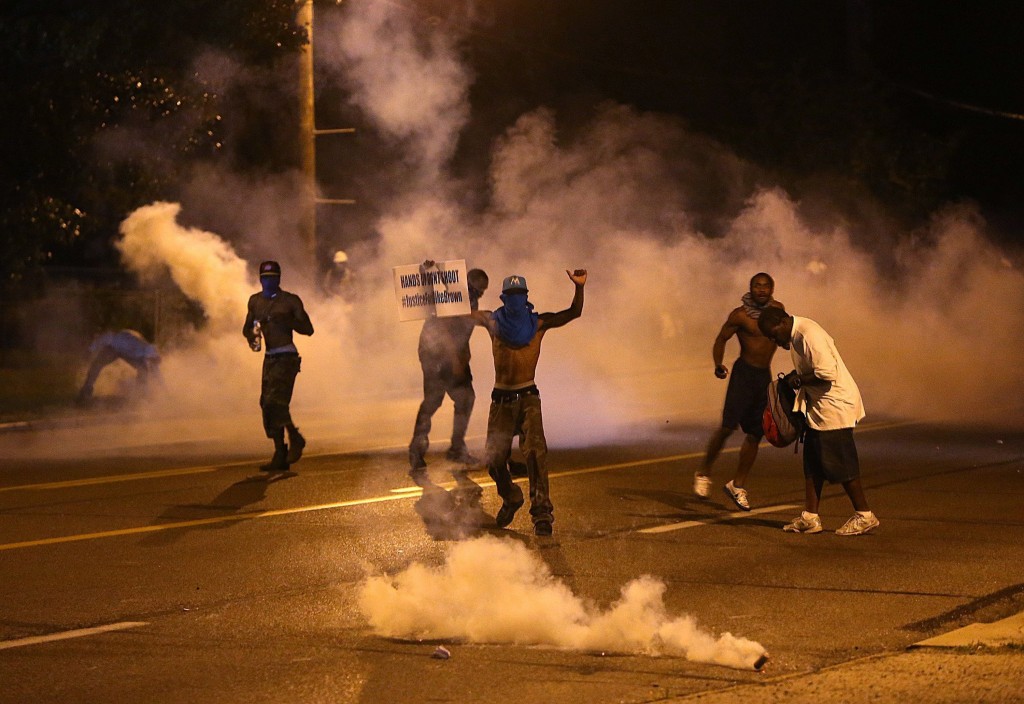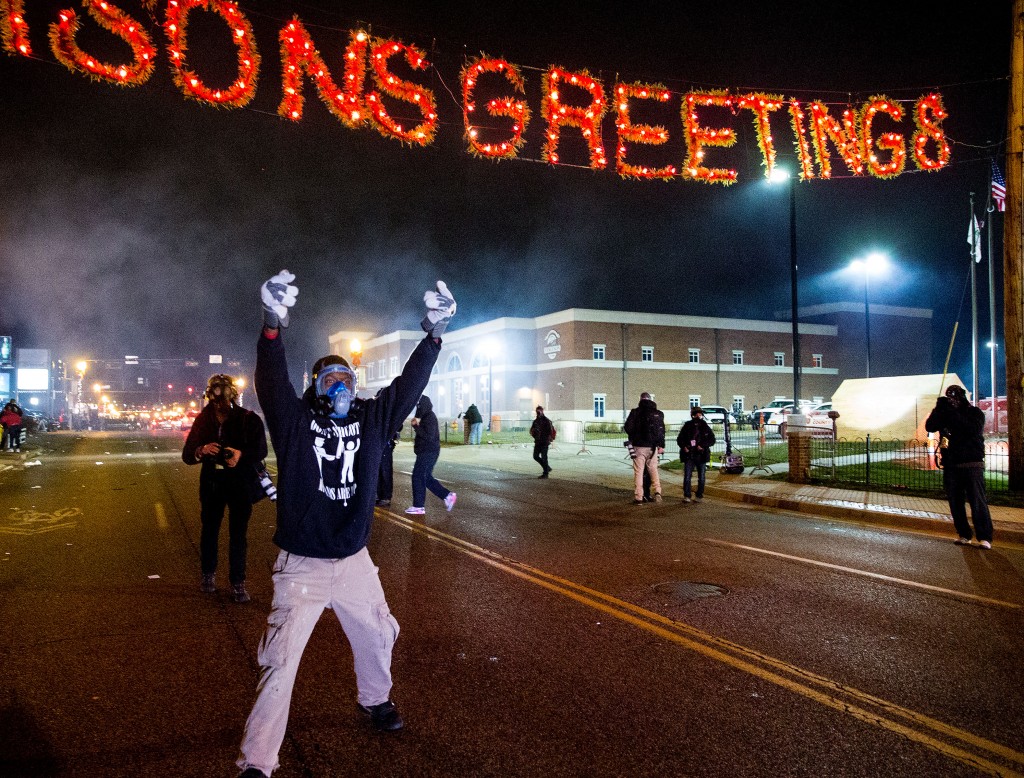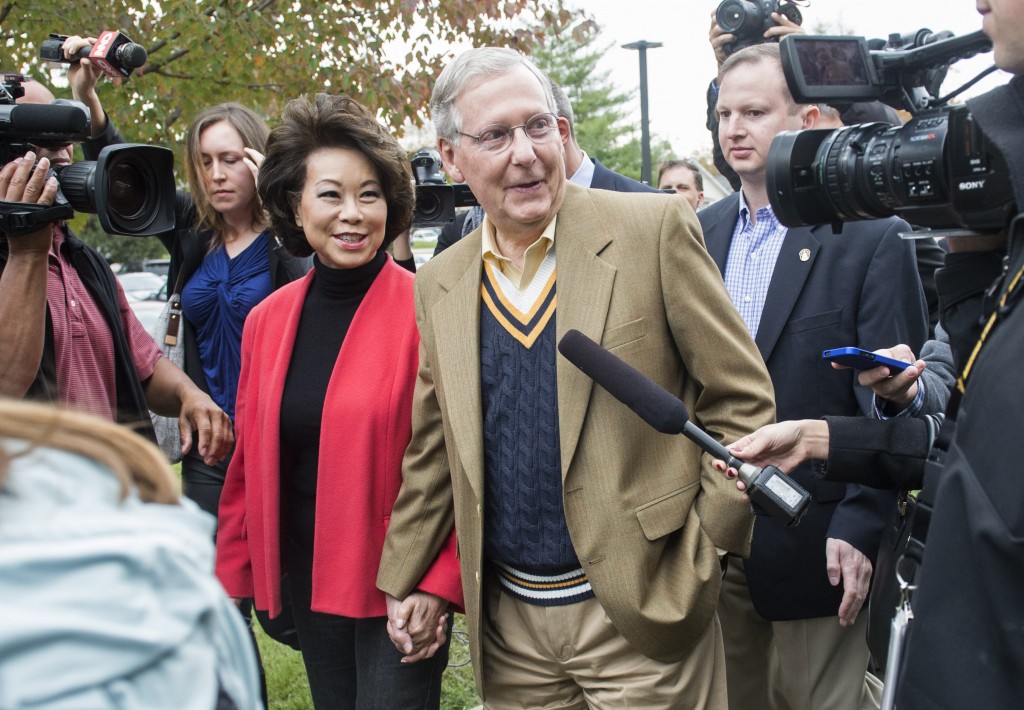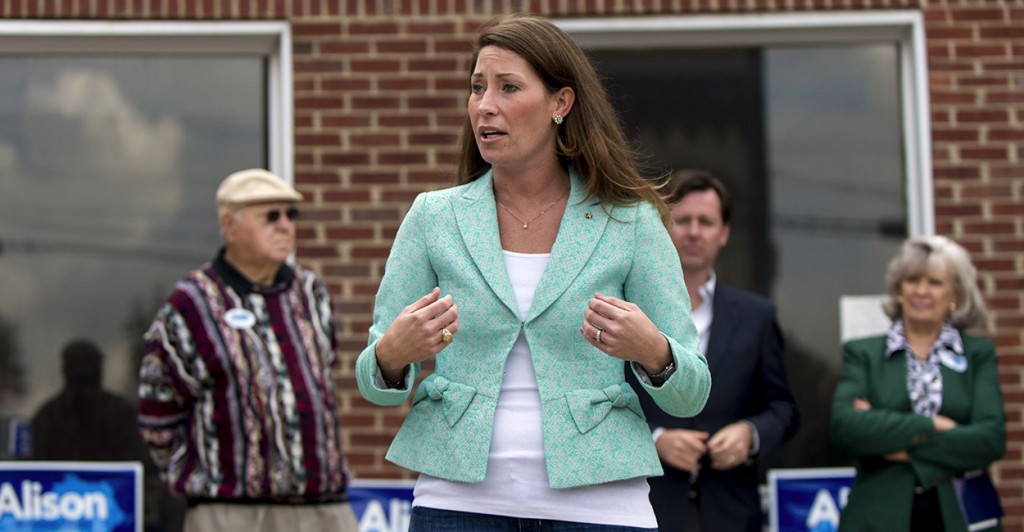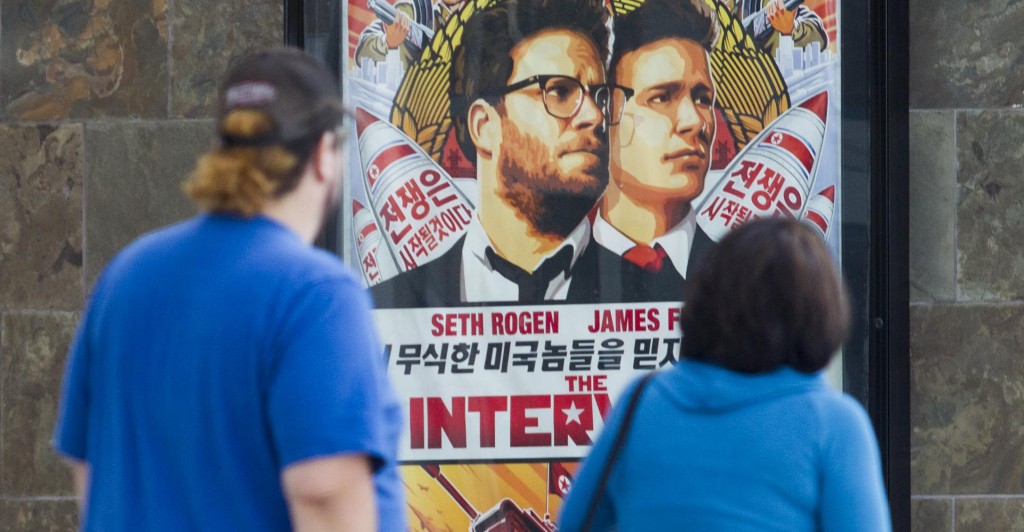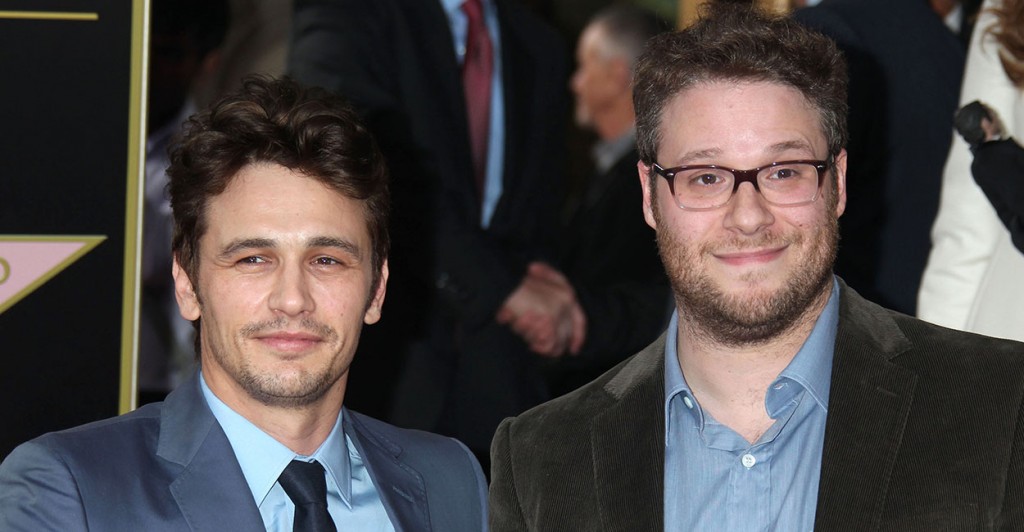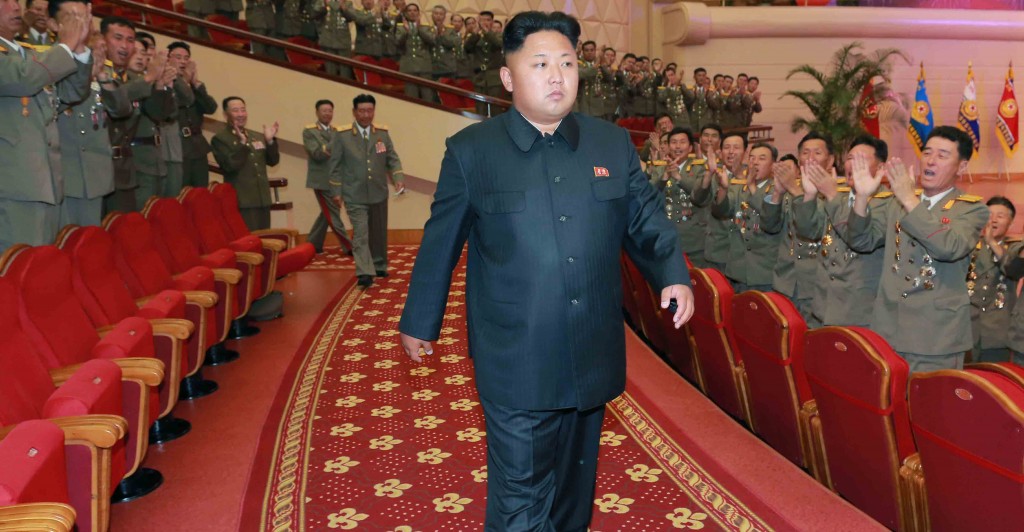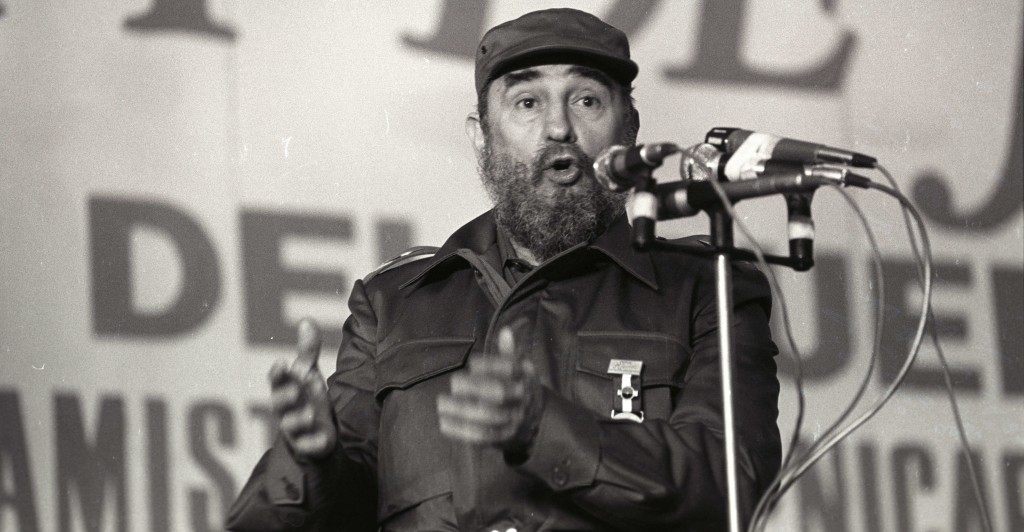As 2014 draws to a close, The Daily Signal looks back at 14 of the biggest news stories across the globe—and the powerful images associated with each.
Obamacare
President Obama’s Affordable Care Act stumbled into 2014 after a rocky launch and continued to face pushback throughout the year.
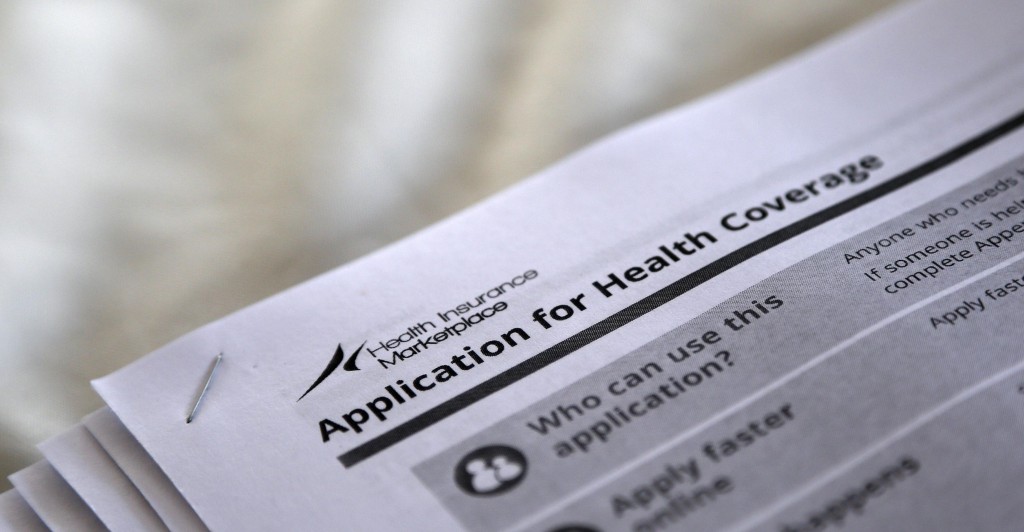
The federal government forms for applying for health coverage. (Photo: Jonathan Bachman/Reuters/Newscom)
The law’s health insurance exchanges took effect Jan. 1, but a lawsuit challenging the legality of Obamacare subsidies may block the law in the 36 states where subsidies are run through the federal government.
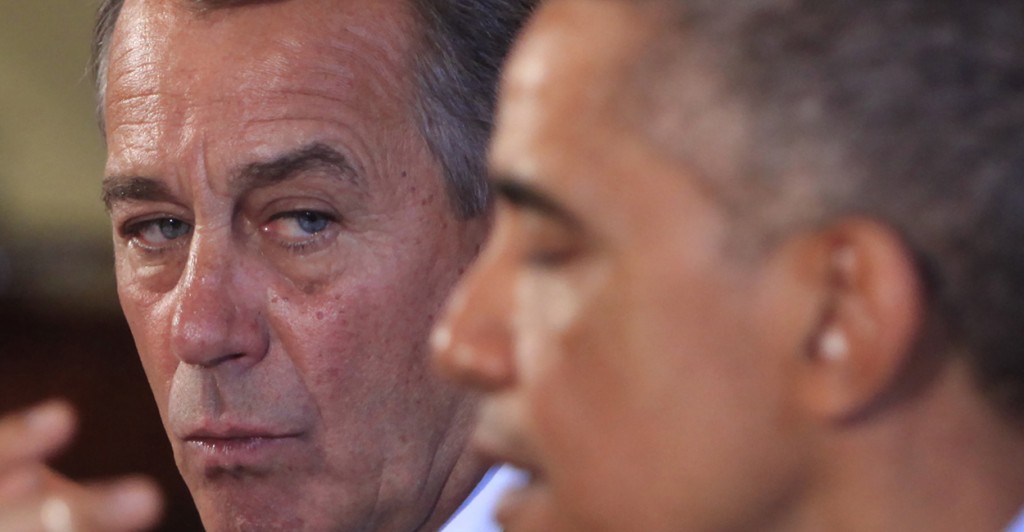
House Speaker John Boehner led Republicans in a lawsuit against the administration. (Photo: Dennis Brack/Newscom)
House Speaker John Boehner led congressional Republicans in a lawsuit against the Obama administration in November challenging the president’s executive actions on the health care law.
The Missing Malaysian Plane
On March 8, Malaysia Airlines Flight MH370 went missing during a flight from Kuala Lumpur to Beijing, carrying 239 passengers and crewmembers.
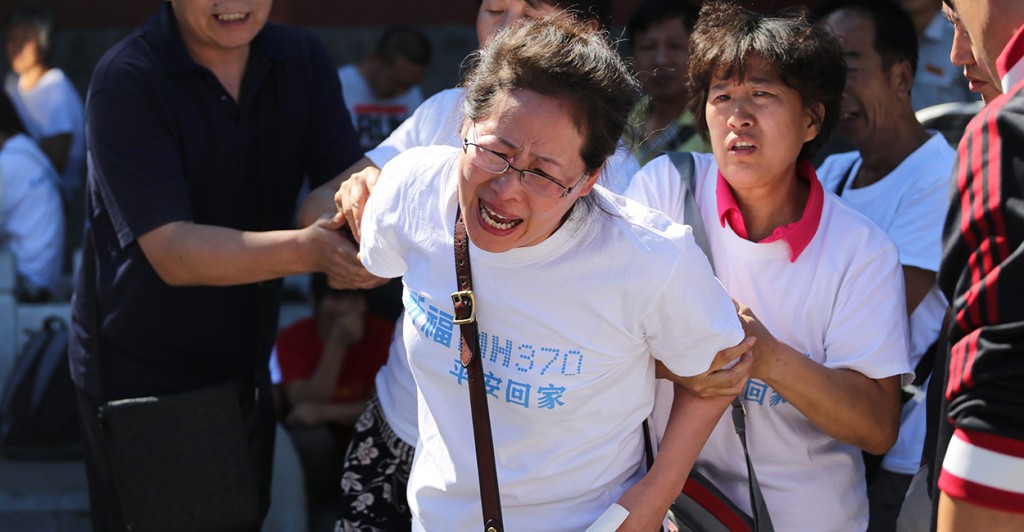
Family members of missing Malaysia Airlines Flight MH370 passengers cry as they gather to pray at Yonghegong Lama Temple in Beijing on the six-month anniversary of the disappearance of the plane. (Photo: EPA/Newscom)
The search for the Boeing 777 began promptly with 26 countries, including the United States, contributing resources toward what would become the most expensive search in aviation history—though it seemed to procure more questions than answers.
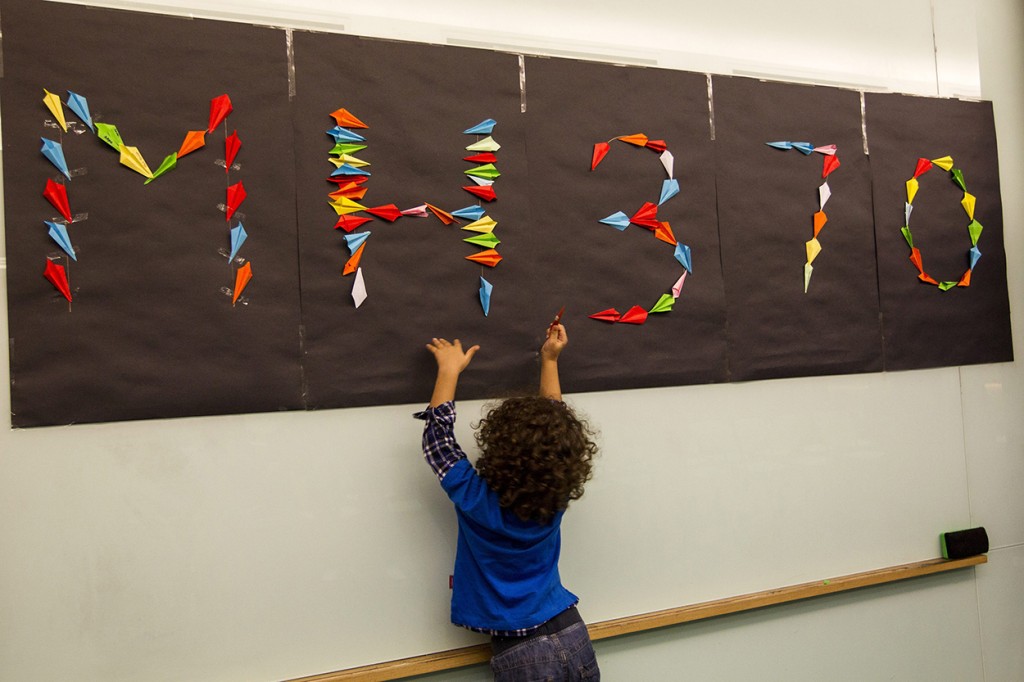
A young relative tries to stick paper planes on a board during an event to remember the 100th day of the missing crew and passengers. (Photo: Azhar Rahim/Newscom)
Australia continues the hunt to this day, scouring the south Indian Ocean nearly 10 months after the plane’s initial disappearance.
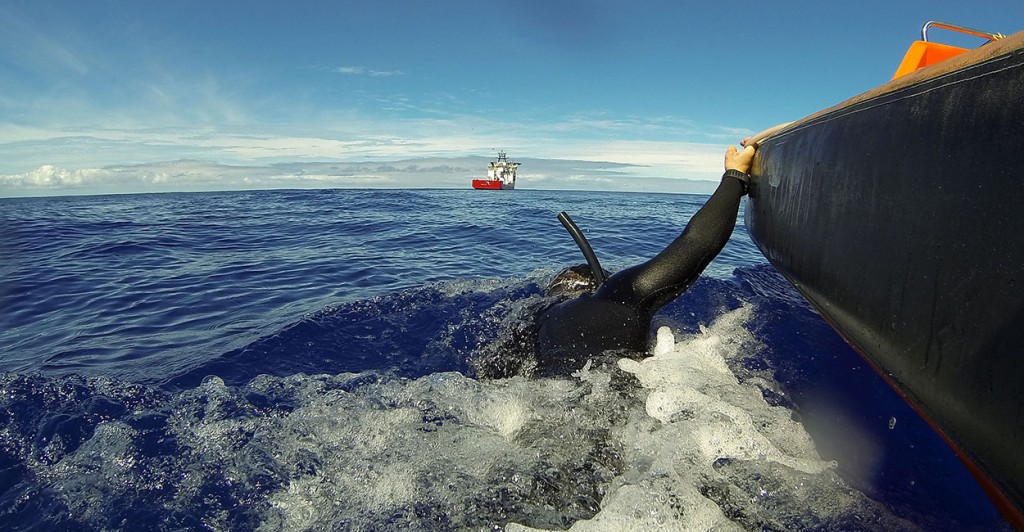
A fast-response craft from Australia tows Seaman Michael Arnold as he searches the ocean for debris of the missing Malaysia Airlines Flight MH 370. (Photo: Ryan Davis/Australian Defence Force)
Putin Annexes Crimea
The Ukrainian revolution faced a stark setback March 18 when Russian President Vladimir Putin signed treaties to annex Crimea, blocking the opposition’s attempts to seek closer ties with the European Union.
Putin’s annexation marked the first time in Europe since World War II that a nation seized sovereign territory from another nation. A week later, the United Nations voted not to recognize Putin’s “illegal” annexation.
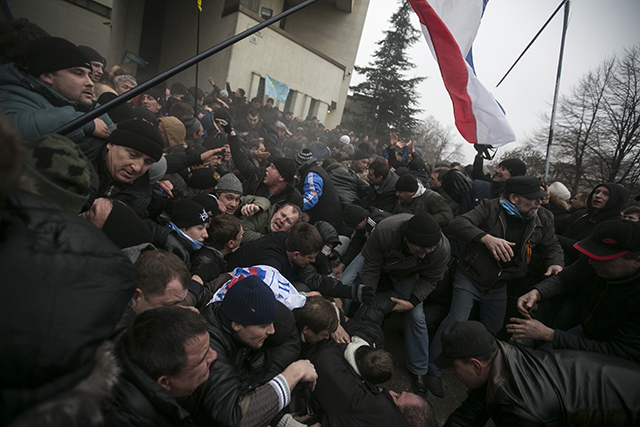
Thousands of pro-Russia separatists tussled with supporters of Ukraine’s new leaders in Crimea as tempers erupted over the future of the region. (Photo: REUTERS/Baz Ratner/Newscom)
The United States aligned with the European Union to enact economic sanctions on Russia, tightening them further following the shooting down of Malaysia Airlines Flight MH17 by pro-Russian separatists.
Boko Haram’s Mass Kidnapping
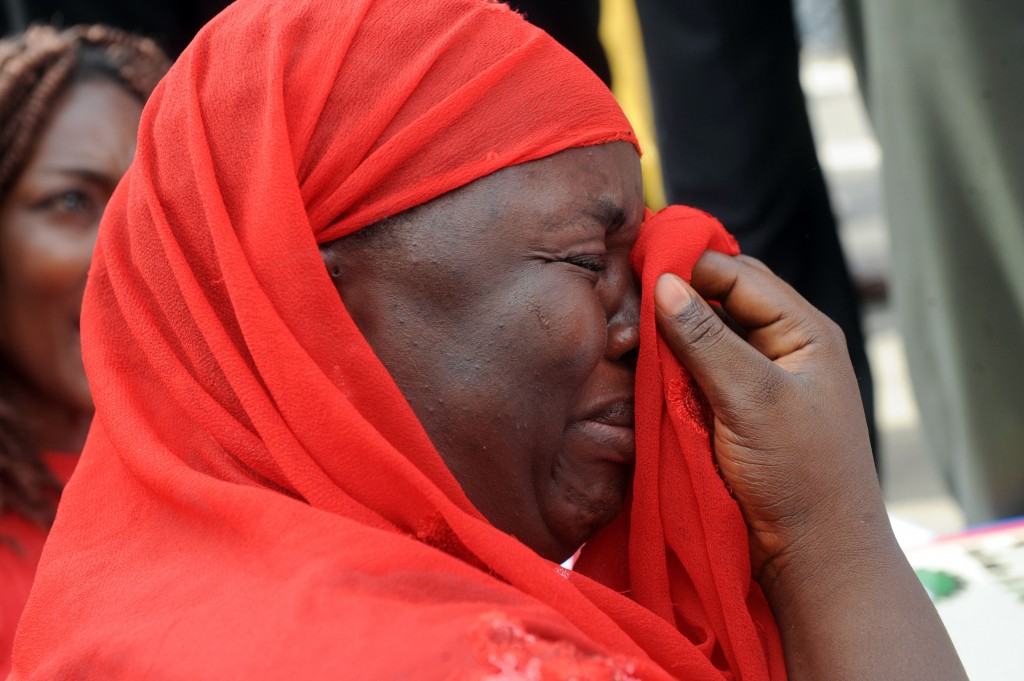
A mother of one of the missing Chibok schoolgirls wipes her tears as she cries during a rally by civil society groups pressing for the release of the girls in Abuja. (Photo: Getty Images/Newscom)
Under the mask of night, Boko Haram militants kidnapped 276 Nigerian schoolgirls from their dorms in the secluded town of Chibok on April 14.
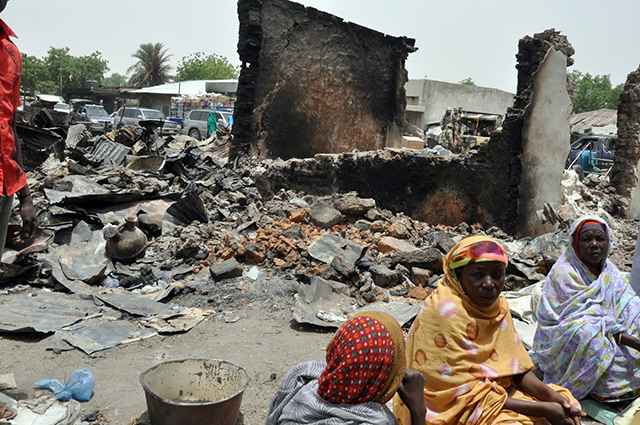
Women sit at Gamboru central market, which was burned by suspected Boko Haram fighters. (Photo: Newscom/Getty Images)
Fifty-seven escaped, but leader Abubaker Shekau said he forced the remaining girls to convert to Islam and sold them as slave brides.

A screengrab taken from a video purportedly from Islamist group Boko Haram released on YouTube shows a man holding an AK-47 rifle. (Photo: YouTube)
The abduction sparked the momentous Twitter hashtag #BringBackOurGirls, which pushed the story further into international prominence.

Mothers of the missing Chibok schoolgirls abducted by Boko Haram Islamists gather to receive information from officials. (Photo: AFP/Newscom)
Nigeria claimed in October to have reached an agreement with Boko Haram that included the release of the kidnapped girls, but the terrorist group denied the deal occurred.
Veterans Affairs Scandal
The extent of the failures of the VA hospital system came to light April 23 when CNN revealed at least 40 veterans died awaiting treatment at the Phoenix Veterans Affairs Health Care system.
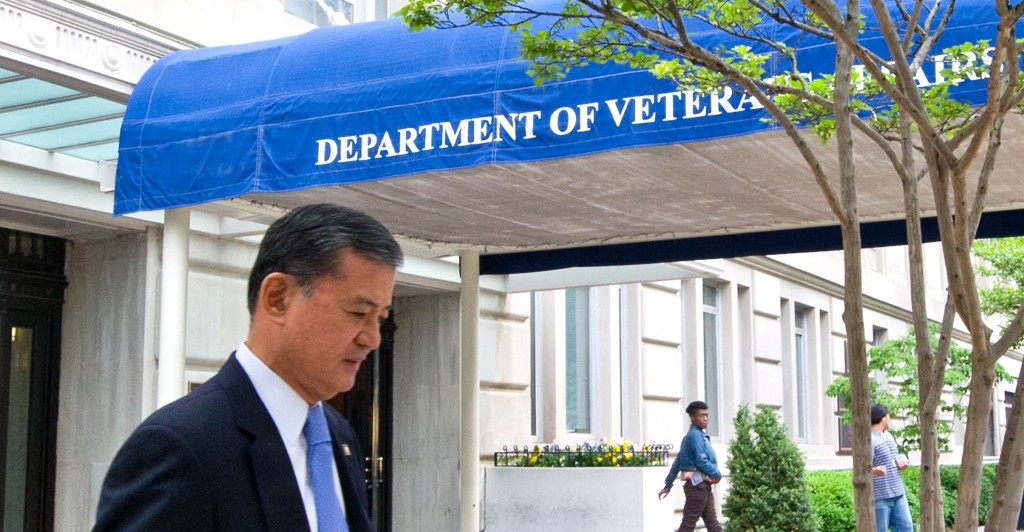
Veterans Affairs Secretary Eric Shinseki departing the VA on his way to the White House. (Photo: AFP/Getty Images)
The Department of Veterans Affairs inspector general reported that 1,700 veterans in the Phoenix medical center were placed on secret waiting lists to hide the gravity of the delays from VA officials in Washington, D.C.
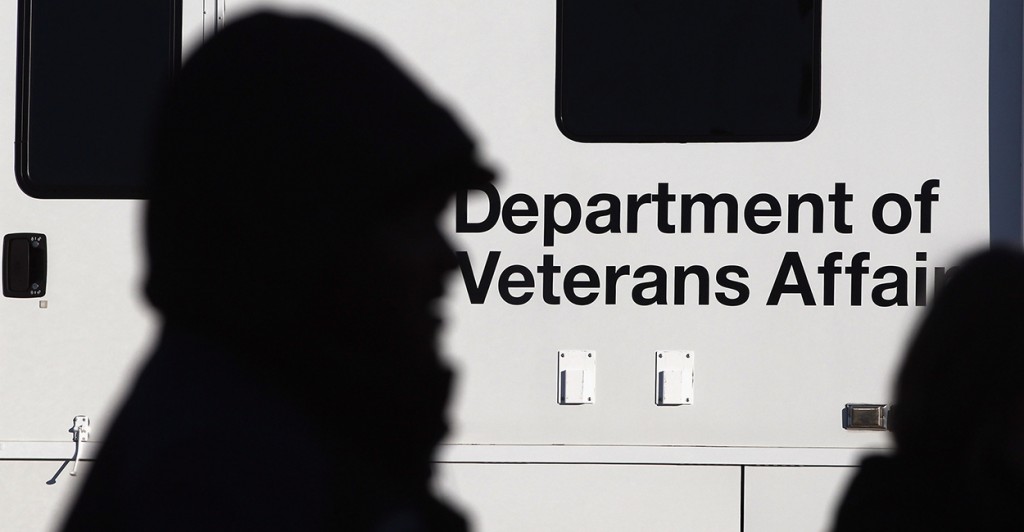
More than 120,000 veterans waited an excessive amount of time for care. (Photo: John Moore/Getty Images)
Obama immediately called for an investigation following similar cover-ups and misconduct in VA medical centers across the nation. An internal VA audit disclosed more than 120,000 veterans waited an excessive amount of time for care or never received it at all.
The scandal eventually forced the resignation of numerous senior officials, including VA Secretary Eric Shinseki in May.
The Rise of ISIS
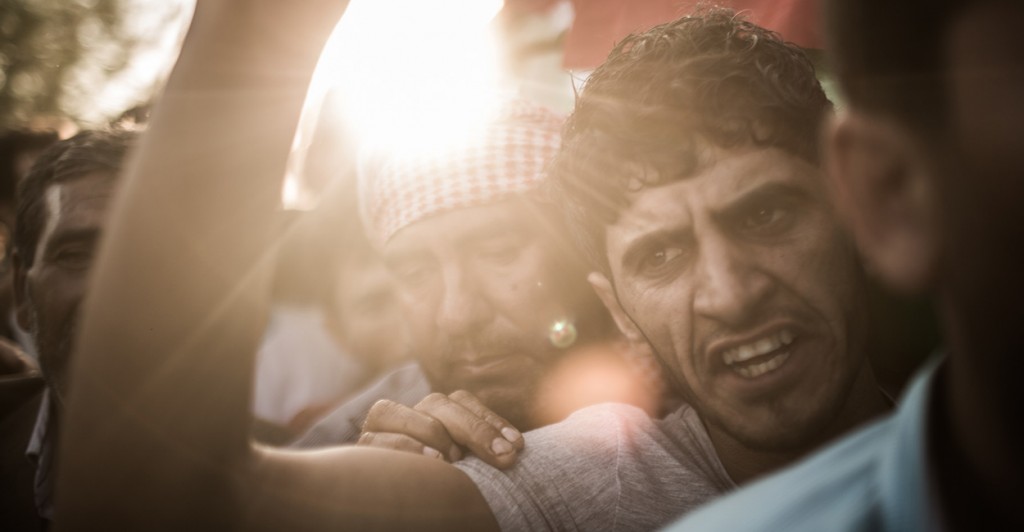
Hundreds of people in the Turkish village of Suruc, near the border town of Kobane in northern Syria, accompany the coffins of three Kurdish fighters who died while battling ISIS militants. (Photo: Barbaros Kayan/Newscom)
The Islamic State in Iraq and Syria captured international attention in June after seizing Iraq’s second largest city, Mosul.
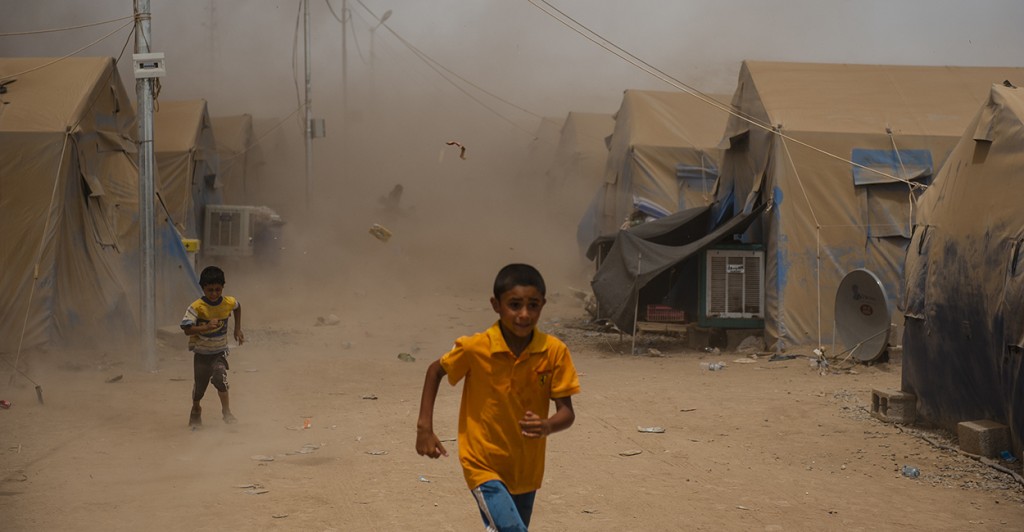
Children run as a sandstorm hits a refugee camp for those who fled the ISIS threat in Mosul, Iraq. (Photo: Martin Alan Smith/Pacific Press/Newscom)
The extremist group has since swept through Iraq and Syria with brutal force, capturing land and threatening murder, torture and exile for those who do not convert to Islam.
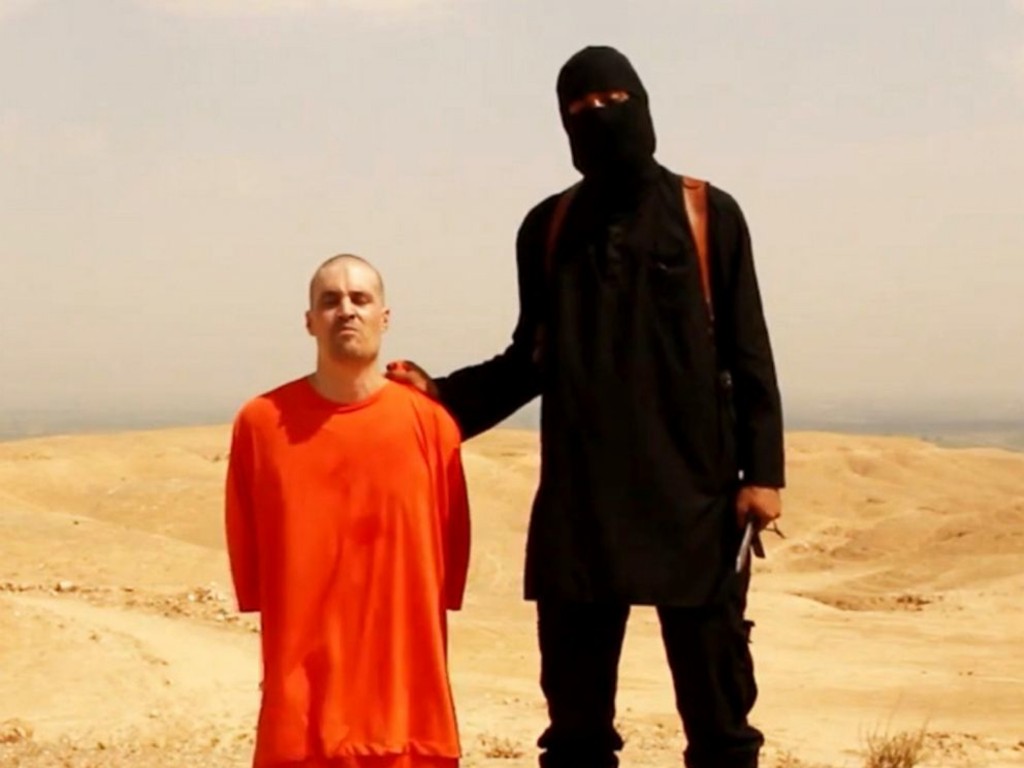
A videograb shows a masked ISIS militant holding a knife next to U.S. journalist James Foley. (Photo: Newscom)
The group has recruited thousands of foreign fighters through its violent propaganda, primarily disseminated through social media. Its graphic beheading videos fueled international involvement an included the Aug. 19 murder of American journalist James Foley.
The United States carried out airstrikes against ISIS following Obama’s promise to “degrade and ultimately destroy” the extremist group.
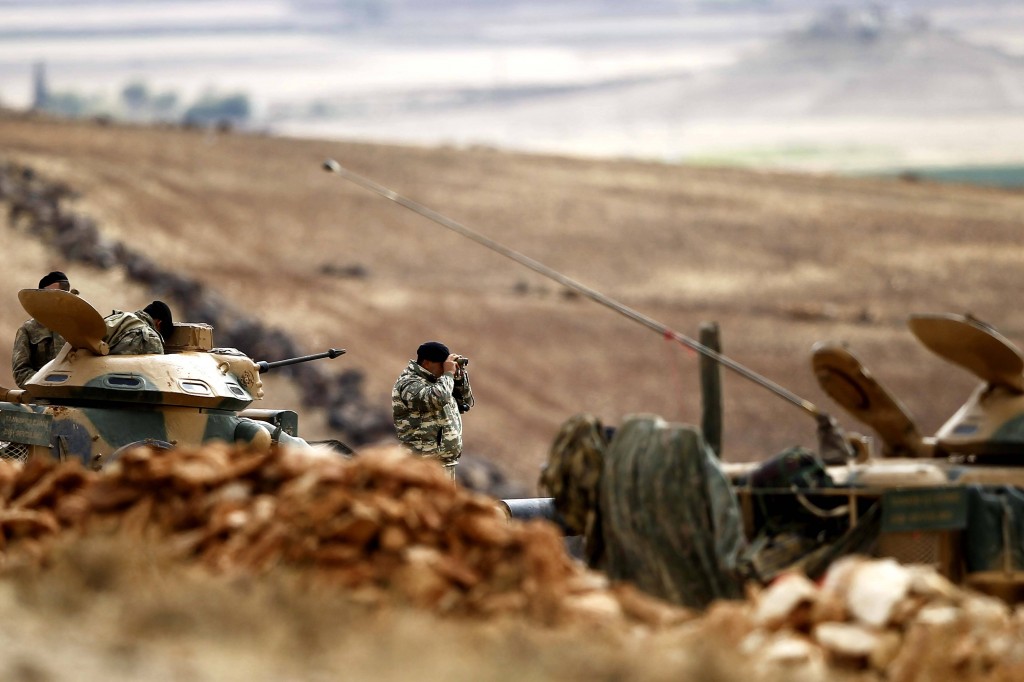
A Turkish army investigator in the border area of Turkey, several miles away from Kobane, Syria. (Photo: Newscom)
Israel’s Operation Protective Edge
Hamas’ kidnapping and murder of three Israeli teenage boys, coupled with rocket attacks in June, ignited Israel’s forceful counter campaign, Operation Protective Edge.
The operation, launched July 8, lasted seven weeks and included ground invasions and airstrikes in the Gaza territory. More than 2,200 people were killed.
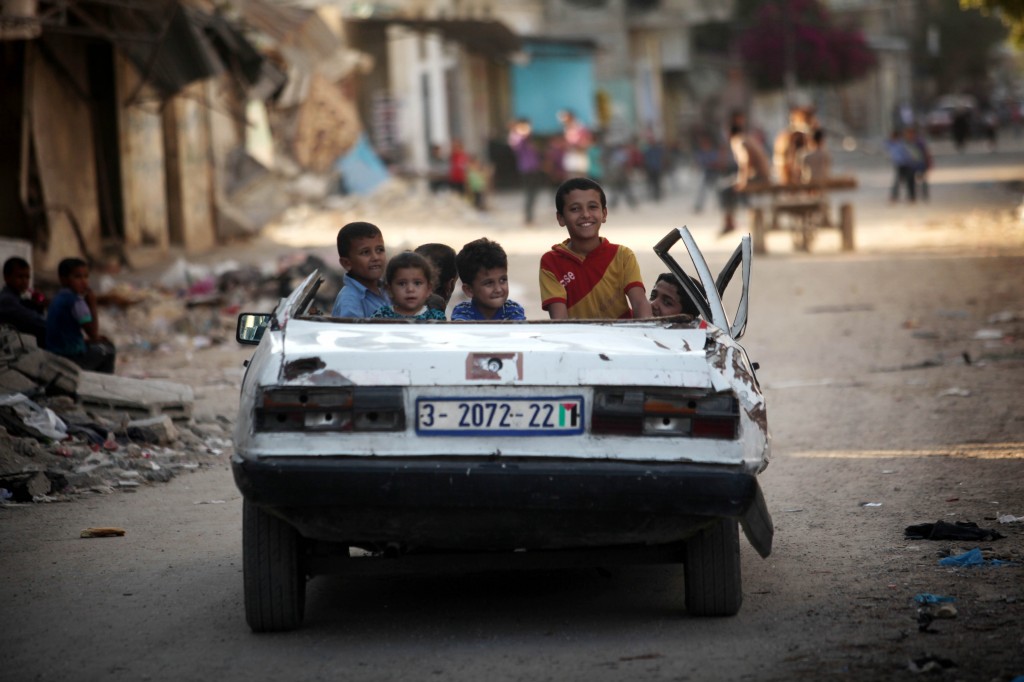
Palestinian children ride through a bomb-damaged area of Beit Hanoun in a car with no roof. (Photo: Majdi Fathi/NurPhoto/Newscom)
Israel and Hamas agreed to a final ceasefire Aug. 26, but tensions remain high.
The Ebola Epidemic
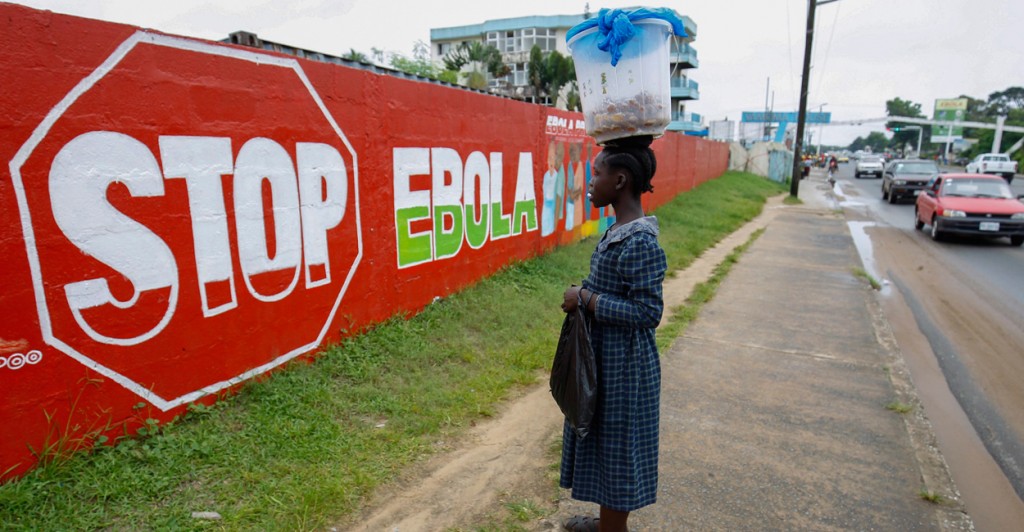
A woman looks at an Ebola informational mural in Monrovia, Liberia. (Photo: Ahmed Jallanzo/EPA/Newscom)
The first known case of Ebola was contracted in Guinea in December 2013. By early August, it had killed more than 1,000 people. The World Health Organization declared the disease an “international health emergency” Aug. 8.
Ebola first spread through West Africa and later reached into the United States and Spain. Today, nearly 4,500 people have died of the disease, and its fatality rate has reached 70 percent, according to WHO.
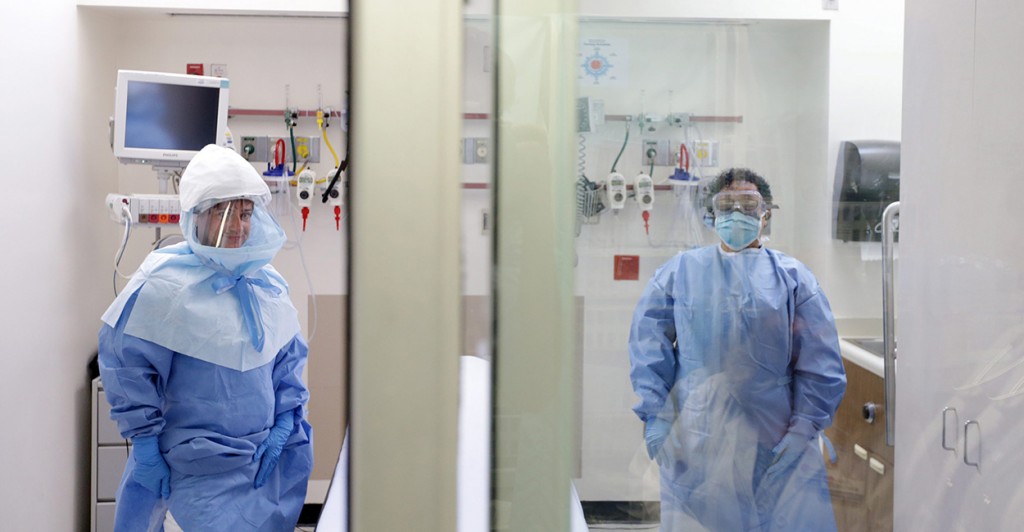
A medical worker wears a protective suit inside an isolation room appropriate to handle people inflected with the Ebola virus at Bellevue Hospital Center in New York. (Photo: Newscom)
The United States deployed 3,000 military personnel to provide equipment and build infrastructure in October to help fight against the disease. Obama also asked Congress earlier this month to approve $6 billion in emergency funding to contribute to the fight.
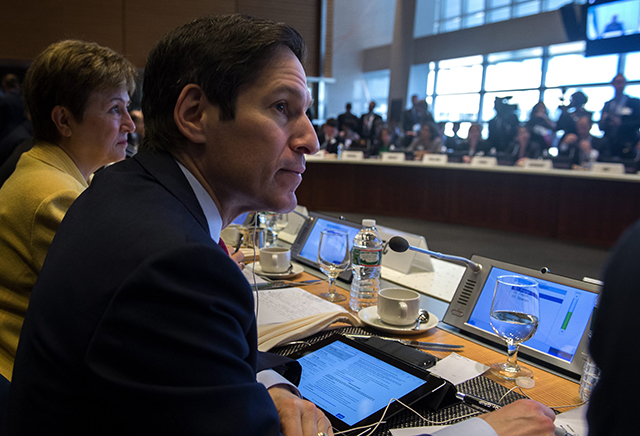
CDC Director Thomas Frieden listens to opening remarks during an Oct. 9 event on Ebola. (Photo: Newscom)
Border Crisis
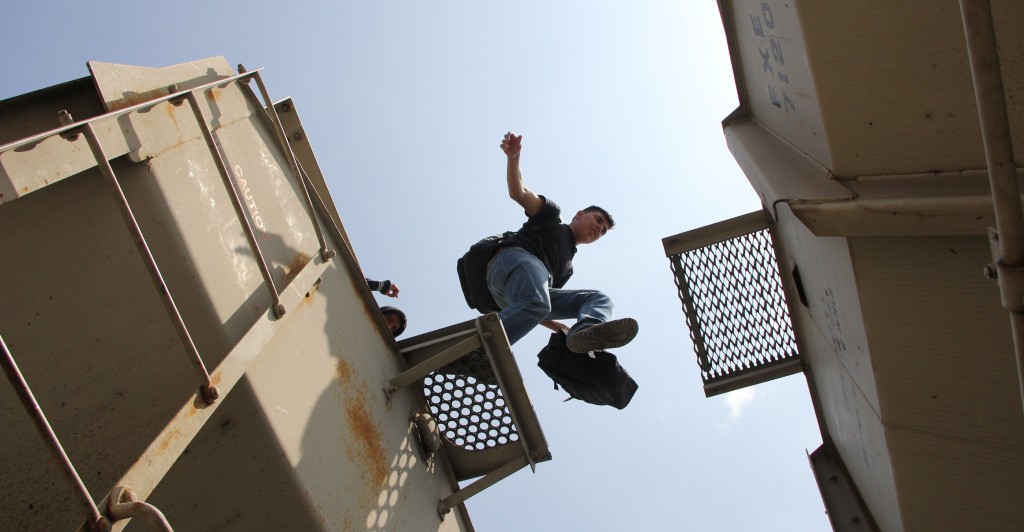
A young man jumps between cars of the cargo train called “The Beast” on the way to the Mexico-U.S. border. (Photo: Elizabeth Ruiz/Newscom)
More than 68,000 unaccompanied minors fled illegally into the United States this year, creating what Obama deemed an “urgent humanitarian situation.”
The wave of illegal immigrants, primarily arriving from Mexico and Central America, so vastly overwhelmed Border Patrol agents many were released on their own recognizance because of the lack of housing.
Obama asked Congress to approve $3.7 billion in emergency funds to curtail the crisis, but the bill failed in July. In November, Obama used executive power to grant amnesty to 5 million illegal immigrants.
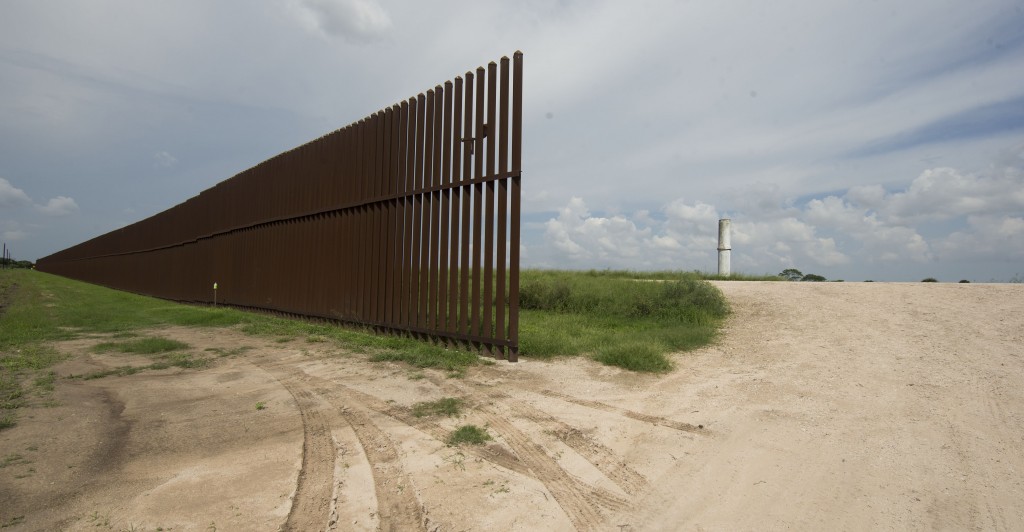
The border wall runs several miles through a rural area east of Brownsville. (Photo: Bob Daemmrich/Newscom)
ALS Ice Bucket Challenge
The Ice Bucket Challenge went viral in July as Americans, celebrities and political figures dumped buckets of ice on their heads to raise money and awareness for Lou Gehrig’s disease.
Donations to the ALS Association generated by the challenge exceeded $100 million in August, Time reported. The ALS Association said it raised $2.8 million in the same period the previous year, illustrating the steep power of social media in the philanthropic cause.
Ferguson
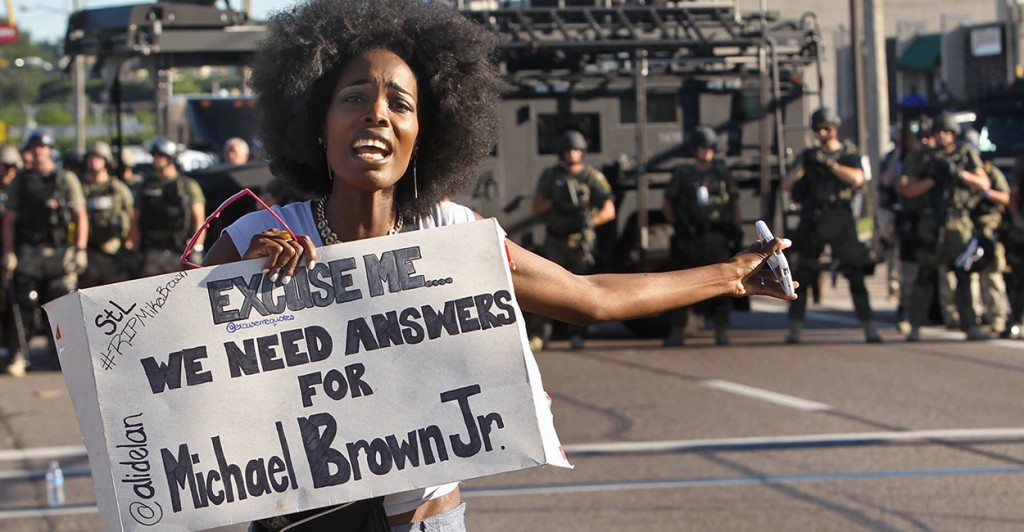
A protester makes her voice heard as a march organized by area ministers makes its way through Ferguson, Mo. (Photo: J.B. Forbes/St. Louis Post-Dispatch/MCT)
Police officer Darren Wilson shot and killed unarmed black teenager Michael Brown on Aug. 9 in Ferguson, Mo.
Protesters took to the streets, citing racial motivation for the killing. Peaceful demonstrations quickly turned violent. Stores were burned, shops were looted and police fired tear gas following clashes, arresting journalists and protesters and pushing the story to the top of the news.
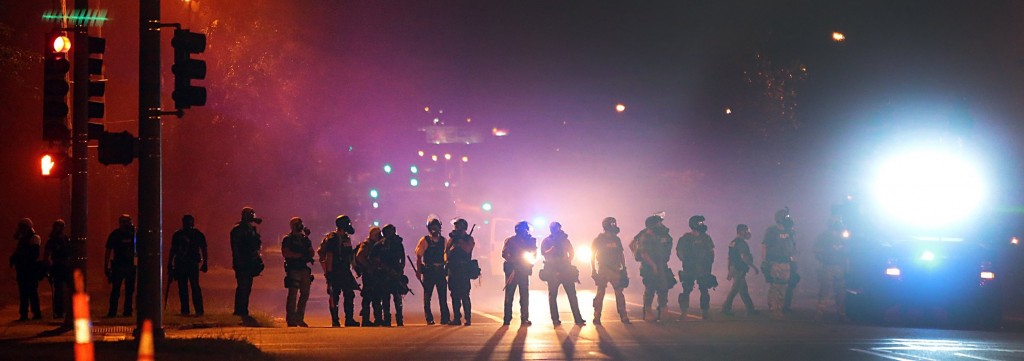
Tactical officers work their way north on West Florissant Avenue in Ferguson, clearing the road of protestors. (Photo: Robert Cohen/St. Louis Post-Dispatch/MCT)
When a grand jury didn’t indict Wilson on Nov. 24, a new wave of protests sprung up across the United States and in several European cities.
The Ferguson riots sparked a national debate about racial division, furthered by the death of Eric Garner after a New York police officer put him in a chokehold. The Twitter hashtag #ICantBreathe ignited movements globally.
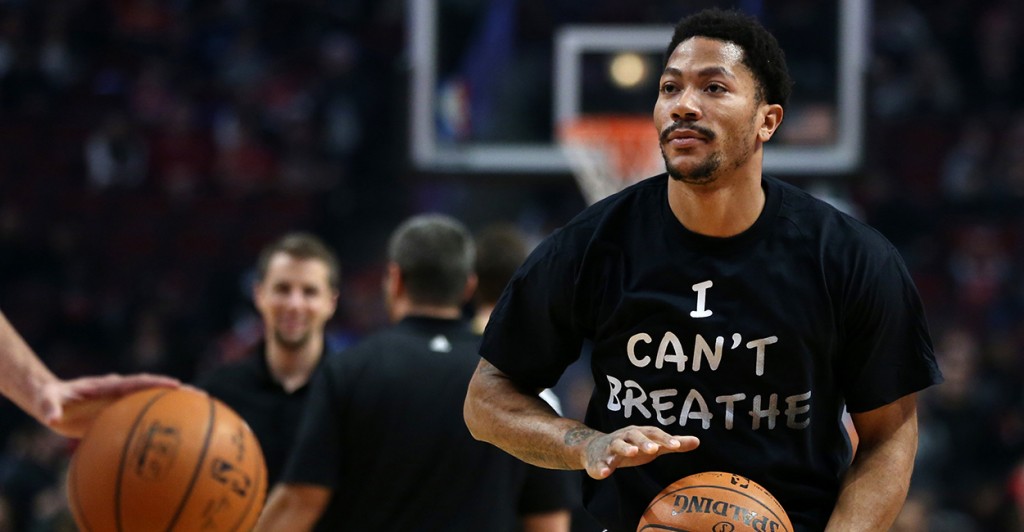
Chicago Bulls guard Derrick Rose wears a shirt reading ‘I Can’t Breath’ while warming up. (Photo: Chris Sweda/Chicago Tribune/Newscom)
Republican Wave
The 2014 midterms proved momentous for the Republican Party as the GOP flipped the Senate and expanded its hold on the House, gaining full control of Congress.
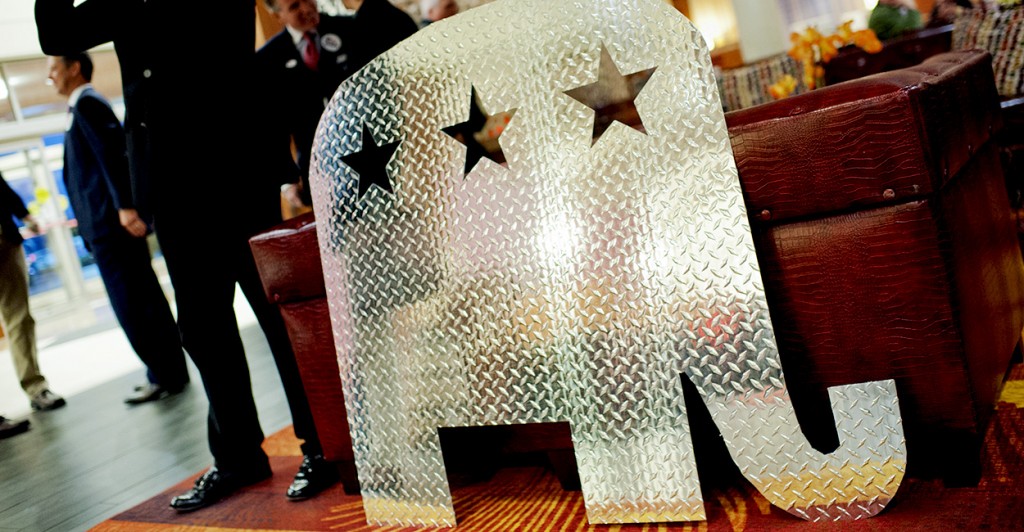
A metal cut out of an elephant sits in the bar of during a party for Kentucky Republicans in Louisville, Ky. (Photo: Tom Williams/CQ Roll Call/Newscom)
The sweep was dubbed a “tidal wave” election as the GOP seized eight Democratic Senate seats and toppled three Democratic governors.
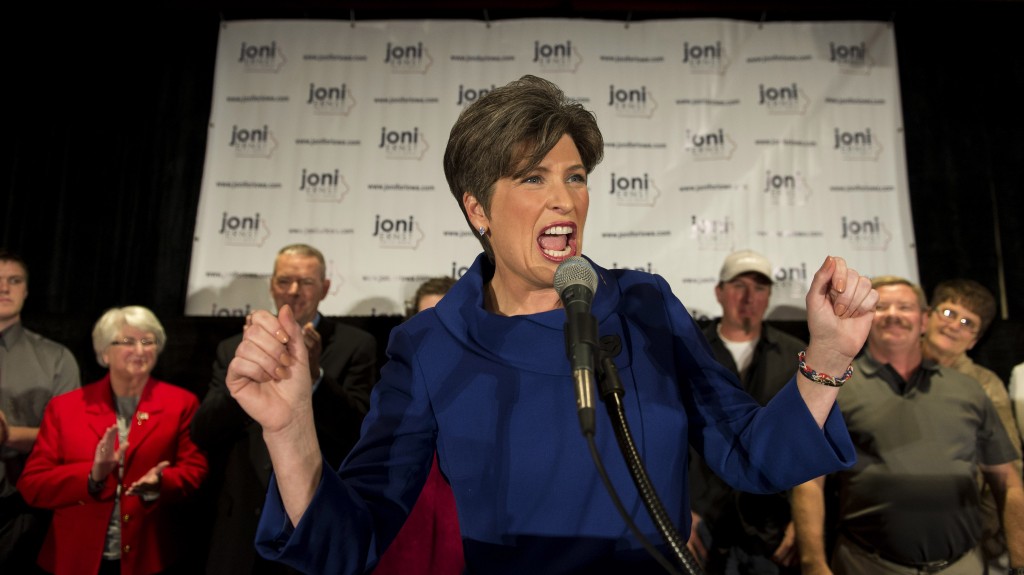
Sen.-elect Joni Ernst makes her victory speech at the Iowa Republican election night party at the West Des Moines Marriott. (Photo: Newscom)
The election also marked historic feats.
South Carolina’s Sen. Tim Scott became the first black senator to win an election in the South since the 19th century, Utah’s Mia Love became the first black Republican woman elected to Congress, and New York Republican Elise Stefanik became the youngest woman ever elected to Congress at 30 years old.
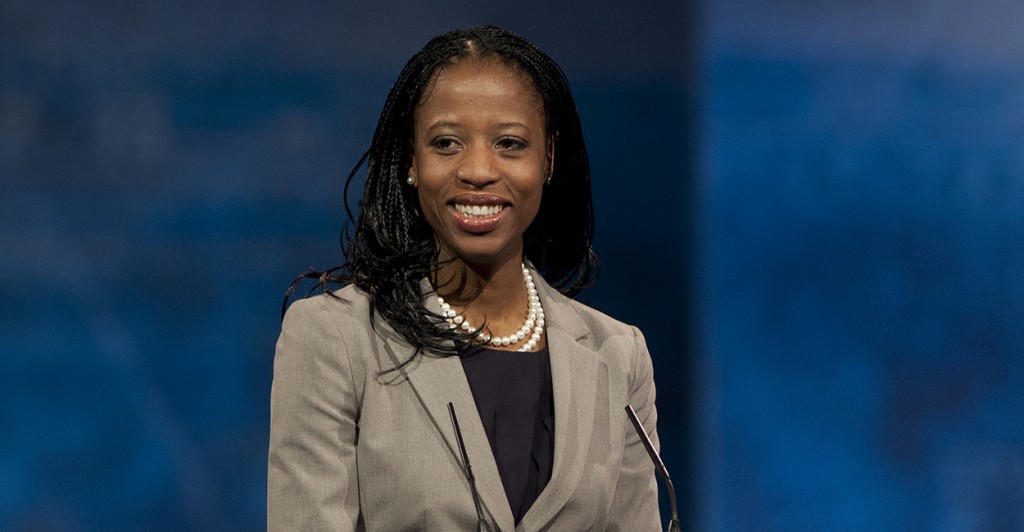
Utah’s Mia Love became the first black Republican woman to be elected to the House. (Photo: Douglas Graham/CQ Roll Call/Newscom)
Sony Hacking
Sony faced immense embarrassment Nov. 24 after a shadowy group of hackers called the “Guardians of Peace” disseminated personal data, including private employee emails, salary information and Social Security numbers.
Sony then faced backlash for canceling the premier of “The Interview,” a comedy depicting the assassination of North Korean leader Kim Jong-un, after the hackers threatened 9/11-style terrorist attacks Dec. 16. Three days later, the FBI linked the hackers to the North Korean government.
Obama addressed the hack in a press conference, saying Sony “made a mistake” in pulling the film.

Obama confirmed that North Korea was behind the hack attack on Sony Pictures at his Dec. 19 press conference. (Photo: Kevin Dietsch/Newscom)
Cuban Embargo
Obama announced Dec. 17 that the United States would begin to restore diplomatic relations with Cuba, lift the trade embargo and establish an embassy in Havana for the first time in more than 50 years.
The announcement followed a prisoner swap 18 months in the making, securing the release of U.S. contractor Alan Gross in return for the release of three Cuban intelligence agents.

Religious groups and family members hold vigils outside the Cuban interests section in support of Alan Gross, the U.S. contractor who was imprisoned in Cuba. (Photo: Olivier Douliery/Newscom)
The plan for diplomacy provoked sharp partisan divide, as the majority of Republicans oppose the embargo lift and many Democrats support it.

